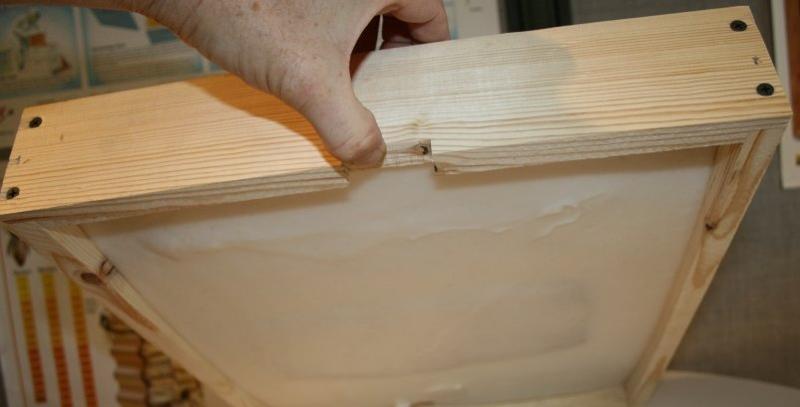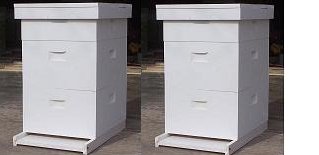We are located in central Illinois and boy has it been hot and humid. We've received 5.40 inches of rain for the month of August. The average for our area is 3.5 inches. The extra rain has not only given way for more mosquitoes but some pretty hot and humid days. In late afternoon our bees are hanging all over the top and bottom of the hive trying to remain cool.
We have a few queens still for sale this week. Call us today after 10am 217-427-2678.
In today's blog, I want to encourage you to consider combining a very small and weak colony with a stronger colony before winter. Late summer and early fall is a great time to combine hives that are just too small to make it through a cold, windy, long winter.
Can you feed a small colony and help them survive the winter? Maybe, but it just depends on how small they are. I encourage beekeepers to feed all their hives in late summer and fall. Feeding bees protein and sugar can make a huge difference in winter survival.
Dangers Of Combining
If a weak colony just never took off this year there is a reason. That reason could be that the queen didn't lay well enough. But, it could also mean that your hive has a contagious disease. If you combine a sick hive with a healthy hive guess what's likely to take place. They both become infected. So you have to know alittle bit about beekeeping and why that weak hive is weak before you combine it with your prize winning, best honey producing hive ever!
My best suggestion is to be sure you do not visually see evidence of American foulbrood or European foulbrood. Then, what might really be hard to know is nosema, a microsporidian. Send some samples of your bees to the Beltsville, Maryland bee lab and they will sample for nosema for you. If all looks good, combining a weak colony with a strong one is a good idea.
Benefits Of Combining
You can always make a spring split if the combined hive overwinters well. And before you combine you will have to do something with that extra queen. Maybe you need her in a strong hive that lost their queen. Or you might sell her to a beekeeper needing a queen. Sometimes the extra bees from the weak hive, combined with a strong hive, can give the strong hive more leverage for overwintering provided that the strong colony does not have a high viral load from varroa mites. Watch our video below on how to combine hives.
BeeTeam6, A Popular Beekeeping Mentorship Service
 Beekeeping has a huge learning curve. Wouldn't it be nice to have a Certified Master Beekeeper you could contact when you don't know what's going on? Bees do not always do what's in the beekeeping books. Sign up now so you can call me, email or text me your questions, photos or videos about your hives. This is a monthly service and you can cancel at any time.
Beekeeping has a huge learning curve. Wouldn't it be nice to have a Certified Master Beekeeper you could contact when you don't know what's going on? Bees do not always do what's in the beekeeping books. Sign up now so you can call me, email or text me your questions, photos or videos about your hives. This is a monthly service and you can cancel at any time.
Last Class Of 2016
We have one last class for the 2016 year, our Basic Beekeeping course. Each October we offer a beginners course and it always fills up fast! Sign up now.
This year we taught more classes and educated more students than ever before. We offered beginner classes, advance class, queen rearing, the Bee Institute, several "A Day In The Apiary With David" classes, Spring Management classes, "Getting Your Bees Through The Winter" and more. We'll be posting our 2017 class schedule online in October.
Sign up now for our Basic Beekeeping Course, Saturday, October 15th, 8am-1pm. We have 6 spots remaining.Click here
Watch Our Newest Video Showing Two Ways To Catch A Swarm
Make sure capturing the swarm does not put you in danger of falling out of trees or off of ladders. Trying to gather $100 worth of bees is not worth a broken leg or worse. Be smart.
Be aware that swarms can leave again after you have given them the perfect home on your property. This is especially true if you captured them within 3 miles of your home. The scout bees probably already had another place in mind. They are still close enough to fly to it.
Are You Afraid To Harvest?
 You did it! Well, we should say your bees did it. They made some honey! But, are you now afraid to remove the supers and harvest the honey? Do you know all about how to harvest the honey properly from the hive? Here's some tips to help you have a great time harvesting that liquid gold!
You did it! Well, we should say your bees did it. They made some honey! But, are you now afraid to remove the supers and harvest the honey? Do you know all about how to harvest the honey properly from the hive? Here's some tips to help you have a great time harvesting that liquid gold! Winter is unpredictable.
Winter is unpredictable.If only we knew if it was going to be harsh or bad. Don't take a chance again! This time, be ready. Give your bees a chance. http://www.honeybeesonline.com/feeders/
Our Popular Late Summer
& Fall Feeder
& Fall Feeder
 Are you prepared to feed your bees when the nectar flow ends in a few weeks? Got a plan? Two years ago we introduced The Burns Bees Feeding System. No more smashing pollen patties between hive bodies frames. Protective screens means no more bees everywhere when you change your feeding jars. Available for 8 or 10 frame hives. Click Here For More Info
Are you prepared to feed your bees when the nectar flow ends in a few weeks? Got a plan? Two years ago we introduced The Burns Bees Feeding System. No more smashing pollen patties between hive bodies frames. Protective screens means no more bees everywhere when you change your feeding jars. Available for 8 or 10 frame hives. Click Here For More Info
TWO HIVES

This is our best deal, two completely assembled and painted hives with wooden frames and foundation. Click Here For More Info.







